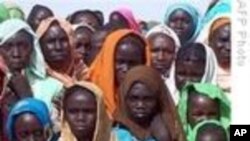<!-- IMAGE -->With continuing violence in Darfur, an incomplete peace between once-warring provinces in the north and south, and millions of internally displaced people, the situation in Sudan is one of the greatest humanitarian crises of the 21st century. The United States has long worked to confront the Sudanese government to end conflicts in the region and respect human rights, and now it is stepping up its efforts in the interests of the Sudanese people.
In the past, the U.S. hoped economic and diplomatic pressure would bring greater cooperation from Khartoum's leaders. Since 1997, American companies have been banned from doing business with Sudan's government and restricted in buying Sudan's oil, a key export.
While this approach has produced some success, such as helping broker peace negotiations that ended 21 years of civil war between the north and south, more clearly needs to be done.
While the economic sanctions imposed by the U.S. Congress will remain in place, the U.S. now will provide incentives for the Khartoum government to work with Washington and the international community on the important security and human rights issues confronting them.
"If the government of Sudan acts to improve the situation on the ground and to advance peace, there will be incentives," said President Barack Obama. "If it does not, then there will be increased pressure imposed by the United States and the international community."
The announcement comes after a lengthy review of what the U.S. has accomplished in the region and what more needs to be done. It also comes as Sudan prepares for national elections next year and a United Nations-sponsored referendum in 2011 on whether the nation remains united or begins a process to create separate and viable states in the south and north.
Greater international involvement will be crucial for helping Sudan deal with these challenges and maintain regional stability. The U.S. is committed to doing its part, and it is up to leaders in Khartoum to do theirs.
In the past, the U.S. hoped economic and diplomatic pressure would bring greater cooperation from Khartoum's leaders. Since 1997, American companies have been banned from doing business with Sudan's government and restricted in buying Sudan's oil, a key export.
While this approach has produced some success, such as helping broker peace negotiations that ended 21 years of civil war between the north and south, more clearly needs to be done.
While the economic sanctions imposed by the U.S. Congress will remain in place, the U.S. now will provide incentives for the Khartoum government to work with Washington and the international community on the important security and human rights issues confronting them.
"If the government of Sudan acts to improve the situation on the ground and to advance peace, there will be incentives," said President Barack Obama. "If it does not, then there will be increased pressure imposed by the United States and the international community."
The announcement comes after a lengthy review of what the U.S. has accomplished in the region and what more needs to be done. It also comes as Sudan prepares for national elections next year and a United Nations-sponsored referendum in 2011 on whether the nation remains united or begins a process to create separate and viable states in the south and north.
Greater international involvement will be crucial for helping Sudan deal with these challenges and maintain regional stability. The U.S. is committed to doing its part, and it is up to leaders in Khartoum to do theirs.













